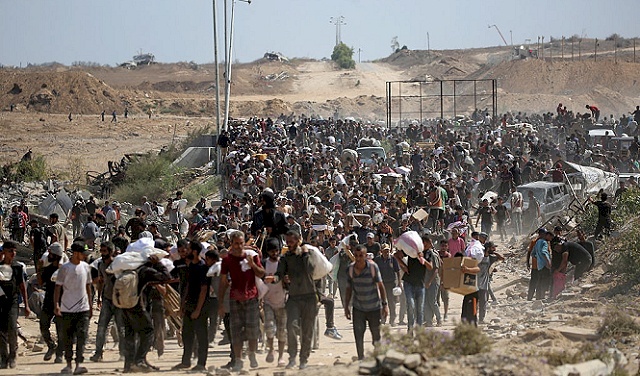
Israeli Experts and Former Diplomats: Annexation and Continued War Will Force European Countries to Impose Severe Sanctions
SadaNews - Experts and former officials from the Israeli Foreign Ministry have warned of severe European reactions against Israel if the war in Gaza continues, or if the government decides to annex areas in the Gaza Strip to Israel. Channel 12 reported today, Sunday, that the former director of the political-strategic division at the Foreign Ministry, Aliza Ben Noun, said, "Pressure is escalating, but we haven't seen its peak yet," following announcements from Western countries that they would recognize the Palestinian state, and the prevention of Israeli ministers Bezalel Smotrich and Itamar Ben-Gvir from entering European countries and banning arms sales.
The former Israeli ambassador to the European Union and NATO, and former head of the United Nations division at the Israeli Foreign Ministry, Aharon Loshno-Yaar, stated that "the annexation will not only provoke anger from the Europeans, but will lead to more than that. This step will bring us to the International Court, and could pose a danger to Israeli citizens around the world. This will be a very severe situation against Israel and it must be avoided."
Experts suggested examples of political measures that European countries might take in response to the annexation of Palestinian lands or the escalation of the war, including suspending the partnership agreement that governs trade, political, and cultural relations between the European Union and Israel, suspending the "Horizon" scientific program, expanding the ban on the entry of Israeli officials into European countries, banning arms sales, requiring Israeli tourists to obtain a visa, economic boycotts, especially of settlement products, and recognition by other countries of the Palestinian state.
It is noted that suspending the partnership agreement requires the approval of all 27 EU member states. Dr. Omer Tsna'ani, head of the political-security division at the "Mitvim" Institute for Foreign Policy, stated that "Hungary is almost the only country preventing the EU from such a decision, and it may drop its opposition due to enormous pressure on it."
Ben Noun added that "friendly countries have succeeded in curbing the attacks on the partnership agreement, but the messages coming from them indicate that it will not be possible to continue opposing the suspension of the agreement for a long time."
Loshno-Yaar indicated that "the important thing also relates to the developing atmosphere, which dictates that it is better not to get close to Israel. This mainly applies to businessmen and major international companies, as well as academia, which we see taking steps daily (public and hidden boycotts of Israeli universities and researchers). This is the danger. These matters are not known in advance. This should concern us and it is already occurring."
Tsna'ani pointed out that "annexing part of the West Bank or the Gaza Strip will compel European countries to take serious steps and will be considered a very serious crime in the eyes of the world. European steps may be gradual or happen all at once, depending on the severity of the Israeli action."
Jeremy Sacharoff, who previously served as Deputy Director General of the Israeli Foreign Ministry and ambassador to Germany, warned that implementing the annexation plan or escalating the war is "something that even Israel's greatest friends, such as the United States and Germany, will not be able to contain while continuing to resist countries calling for increased pressure."
Sacharoff noted that in the Iranian context, Israel's relations with its European allies are of enormous importance. According to him, Britain and France have the capability to reimpose sanctions on Iran.
According to Tsna'ani, "the central question is how far President Trump will be willing to isolate himself along with Israel for Netanyahu's benefit. Trump is under tremendous political and internal pressure to change his policy towards Israel."
Tsna'ani added that "the annexation poses a danger to our relations in the region. Its consequences will range from harming the Abraham Accords to affecting the peace treaties with Egypt and Jordan. For Israel, the peace treaties with Egypt and Jordan are vital interests. The impact could be symbolic, such as closing embassies, but it could also reach the level of canceling peace treaties altogether, and even military provocations against Israel."
Ben Noun warned that "we do not yet see the peak of this development, but we certainly see the direction." Tsna'ani said that "we have never been in a situation like this. There is a real process of isolating Israel and imposing sanctions on it. Israel is dependent on economic relations with other countries and the capability to impact us exists. Damage to the Israeli economy could be quick and painful."

High-level sources reveal to SadaNews: Washington seeks to hold a Gaza Reconstruction Conf...

Corruption Crimes Court Issues Sentences of Imprisonment, Seizure, and Fines in the Case o...

A Report Reveals Trump's 5 Demands from Iran.. Potential Scenarios for Rejection

Occupation notifies immediate demolition of 14 homes in Al-Bustan neighborhood in Jerusale...

Report: Any US Attack on Iran is Not Imminent as Washington Has Not Completed Deploying It...

Al-Shalla to SadaNews: The Conditions of Prisoners in the Occupation's Prisons Have Become...

US Ambassador to Israel Thwarted Messages Warning of a 'Catastrophic Wasteland' in Gaza

